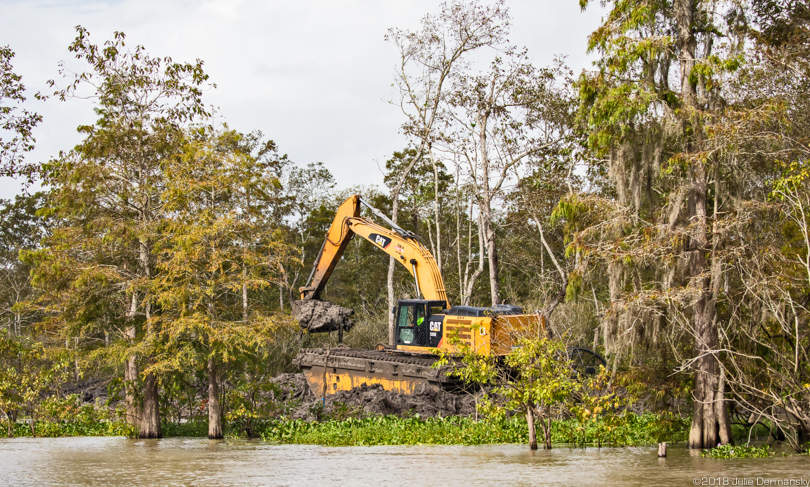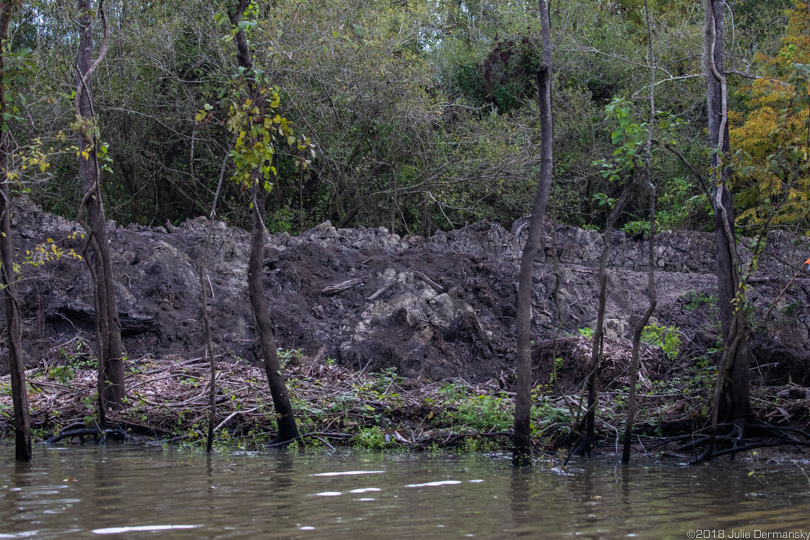
Truthout is a vital news source and a living history of political struggle. If you think our work is valuable, support us with a donation of any size.
High water in Louisiana’s Atchafalaya Basin and direct actions against the Bayou Bridge pipeline threaten to further delay work on the pipeline. However, it likely will be finished before the company’s pending legal challenges, including its most recent one over illegal construction, are settled.
The 163-mile-long pipeline spans southern Louisiana from Lake Charles, near the Texas border, to St. James, on the banks of the Mississippi River. The Bayou Bridge pipeline is the tail end of a crude oil pipeline network that will transport Bakken oil from North Dakota to the Gulf Coast, likely for export.
Currently, the pipeline is 86 percent done and will be completed this year, according to Alexis Daniel, spokeswoman for Energy Transfer Partners, the pipeline’s primary owner.
On October 8, I traveled by boat with Dean Wilson, the executive director of the Atchafalaya Basinkeeper, a conservation group, to check on progress as the pipeline is constructed across the country’s largest river swamp. We found the water in the Atchafalaya Basin about three and a half feet higher than normal, which, Wilson said, could complicate the installation process.
Wilson also found potential code violations, including navigable waterways now blocked and unbroken stretches of trenched dirt piles, known as spoil banks, longer than 500 feet. “There should be a cut in the spoil bank every 500 feet,” Wilson said, and the opening should be 50 feet wide, to keep water flow in the basin unhindered. Many of the cuts we saw appeared considerably smaller.


We found the entrance to Bayou Set, a small natural bayou connected to the pipeline channel, completely closed off by a wall of dirt. Wilson worries that if the entrance is not restored before the pipeline construction is complete — and crews and equipment are still around — the bayou could be closed off for good. And it likely isn’t the only natural bayou cut off by the pipeline channel.
Wilson will report the issue to the US Army Corps of Engineers, which has the authority to enforce regulations. Though what he found is against the rules, there isn’t much enforcement by any regulatory authority going on in the basin, he said.
Landowners Challenge Construction on Their Land
The latest legal challenge facing the pipeline company, Bayou Bridge Pipeline LLC (BBP), was launched at the end of July by Atchafalaya Basinkeeper and a lawyer with Loyola University, which filed suit on behalf of three landowners with a shared interest in a 38-acre parcel of land in the basin. They sought an injunction to stop the construction, alleging that the company illegally trespassed and began work without formally expropriating the land, despite being unable to reach agreements with all of the landowners.
The company argued it did its due diligence to obtain all necessary permission and had in fact gained it from hundreds of others that also have a stake in the same parcel, denying BBP did anything wrong. However, it filed expropriation papers the same day their challenge was made, to enable the company to legally take the land. The Center for Constitutional Rights then joined the legal team in order to fight BBP’s expropriation attempt.
The landowners — brother and sister Peter and Katherine Aaslestad and Theda Larson Wright — join a growing list of landowners across the country who are standing up to pipeline companies trying to seize private land in the current rush to build oil and gas pipelines.
In the weeks that followed the injunction request, members of the L’eau Est La Vie protest camp, opponents of the pipeline known as “water protectors,” set up a campsite on the 38-acre parcel with permission from some of the landowners. Their goal was to stop the installation. About a dozen of them have been charged with felonies under a new Louisiana law enacted in August that makes interfering with “critical infrastructure” like pipelines a federal crime.
On September 10, right before the injunction hearing over the disputed parcel in the basin, BBP agreed to a settlement in which they would halt construction until after an expropriation hearing. It was deemed a victory that both pipeline opponents and environmentalists were quick to celebrate.
Not long after the hearing, I went with Wilson to see how much work had been completed on the disputed land. We found the pipeline completely buried beneath the easement and I sent the Aaslestads photos.
Though initially both elated that construction on their land had been halted, they said my photos showing the pipeline already in the ground made the victory feel hollow, since the work on their land was all but complete when the company agreed to stop working there.

Katherine Aaslestad told me she felt sickened by what the photos confirmed. “This is a miscarriage of justice. The wrong people were arrested,” she told me by phone. “The BBP employees and private security were the real trespassers and should have been arrested, not the water protectors who are genuinely acting for the public good and had been invited to be on the property by a co-owner.”
But lead attorney Pam Spees of the Center for Constitutional Rights, who is working on the case with Misha Mitchell, an attorney with the Atchafalaya Basinkeeper, doesn’t see the victory as hollow at all. Both see BBP’s agreement to stop work on the land until the expropriation process is over as an admission of its previous failure to obtain proper permission.
In the “Public Interest”?
When BBP filed to expropriate the land on September 12, the landowners filed a counter suit challenging the premise that the pipeline is in the public interest, which gives the company the ability to use eminent domain to seize the land
The landowners’ suit alleges that the pipeline offers no public benefit and instead goes against public interests, citing the extensive spill and leak record of Energy Transfer Partners and its affiliates. It also maintains that pipelines have contributed to Louisiana’s coastal erosion crisis and to a reliance on fossil fuels which has exacerbated climate change.
“The destruction of wetlands as a natural buffer to hurricanes and flooding has led to tragic losses in recent years,” Katherine Aaslestad said. “I lost my uncle during Hurricane Katrina and in his memory want to stop the devastation of southern Louisiana.”
With the hearing date set for November 27, Spees sees Energy Transfer Partners’ recently announced partnership with the New Orleans Saints football team as a move to greenwash the company’s reputation. “It is a transparent public relations ploy,” she said.
Katherine Aaslestad agrees. “I know how much football means to Louisianans,” she told me. “Anything that legitimizes them [ETP] in the eyes of average people, makes stopping them or calling them to task even harder. It is like living in a dystopian novel — at least the first chapters.”


Media that fights fascism
Truthout is funded almost entirely by readers — that’s why we can speak truth to power and cut against the mainstream narrative. But independent journalists at Truthout face mounting political repression under Trump.
We rely on your support to survive McCarthyist censorship. Please make a tax-deductible one-time or monthly donation.